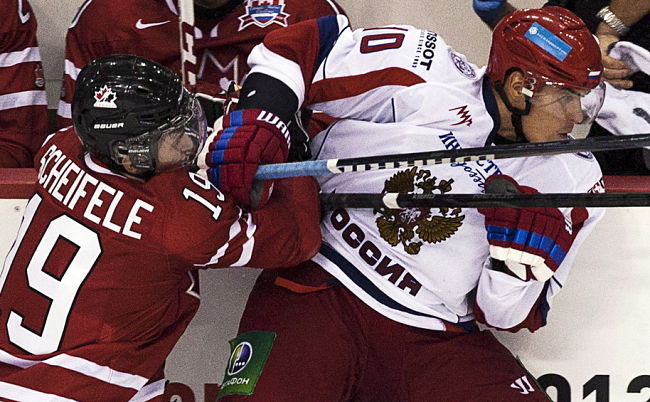Just over a week ago, a jubilant Ryan Strome could barely contain his excitement during his post game interview. "It means a lot to us; we really took it serious and I don't think we realized how big it was until we actually got involved..." The 19 year-old Senators' draft pick helped narrowly avoid what would be the latest of several recent international defeats for Canadian teams with his overtime/series winner. Two straight years of disappointment at both the World Juniors and World Championship, have left Canadian hockey fans hungry for international success at any level. While extremely satisfying, the win and the series' as a whole provided a glimpse into the increasingly interesting situation of Russian, and international players in general, being developed in Canada.
In watching most of the four game series played in commemoration of the '72 Summit Series, it was astonishing to see the similarity between the two rivals' styles of play. Before and including the Summit Series (play involving Russia has always had no end of memorable moments such as the infamous Bobby Clarke slash in '72 and Bob Cole's call in '76), Canadian hockey has been marked by its physical play, highly touted by the ever-provocative Canadian icon, Don Cherry. Throughout the years watching international play, it was not uncommon to see a Canadian team out muscling or outworking a faster or more highly skilled European team. While this has likely contributed to the often overblown stereotype regarding European players' work ethic and style of play, it has become a characteristic that we as fans have come to expect. One particular instance of this which comes readily to mind is Canada's success in the 2006 World Juniors. Coached by Brent Sutter, the underdog Canadian team, led by future NHL role players Steve Downie, Dustin Boyd and David Bolland, defeated highly touted Russian and Swedish teams who had future stars including Evgeny Malkin and Alexander Radulov, simply by virtue of hard work and punishing physical play. This, in addition to being the second of five consecutive gold medals at the World Juniors for Canada, solidified Canadian pride in 'our' style of play.
However, this recent mini-series has marked a shift from our traditionally unique playing styles to a similar one. Watching these games, it was just as likely to see a Russian player clear their crease or take the body as a Canadian, and Russia took advantage of an undisciplined and defensively weak Canadian team for their game 2 and 3 wins. Now while only 6 players from the Russian team have been playing in the Canadian hockey system, the argument can be made that the effect of this on those players and the team as a whole is immeasurable. This stems from the 'top', as Nail Yakupov and Mikhail Grigorenko (the number 1 and twelve picks overall respectively in this past year's draft) both had phenomenal seasons, Yakupov in the OHL and Grigorenko in the QMJHL. Now while a lack of work ethic in certain Russian players such as Alex Semin (recently confirmed by Michael Neuvirth) still exists, it is unfair to say this is unique to players of any nationality. As the number of young Russian and international players who, like Yakupov, realize the value of playing and developing in Canada, our countries' playing styles will grow increasingly similar, each countries players picking up on aspects that make the others successful.
Finally, we may see this create such parity that in competitions such as this past mini-series (with players still in the early stages of development) that we are virtually playing ourselves, the biggest difference coming in the birthplace of our teams' players.

No comments:
Post a Comment